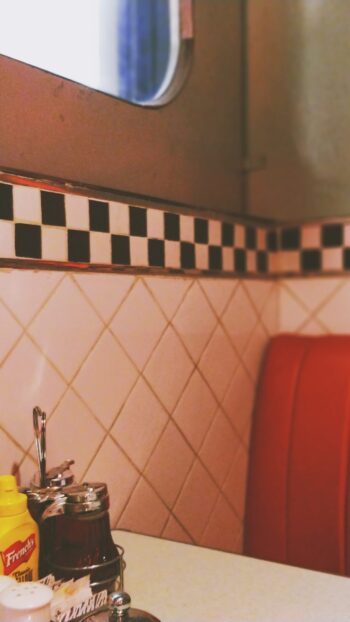Paul said goodbye to our mother loudly as she sat in her recliner a few feet away. He gestured towards the TV before shutting the door. “We put on the Price is Right.”
Outside her room it was more of the same—beige linoleum tiles, stark florescent lighting, the odor of bleach and mothballs. Paul had pointed out my mother’s belongings to her when we first arrived—her needlepoint pillowcases, her porcelain figurines. I couldn’t say if she’d been fooled, but I wasn’t. When we got outside, it was a relief to breathe fresh air.
I walked to Paul’s car eagerly, but he stopped before unlocking the doors. “What about a coffee?” Paul was going to take me to the airport before driving several hours south, back to his wife and children. “This was depressing. Let’s leave with a happier memory.”
He mentioned the run-down coffee shop Lulu’s that had been a few miles from our childhood home, now a similar distance from our mother’s facility.
Since our mother’s diagnosis a year ago, Paul said these types of things more often—these references to creating nicer, lasting memories. I imagined his wife had bought him books on coping that he read before bed. Maybe he wished he’d brought one with him on this two-day trip to Sacramento where we settled our frail, disappearing mother into a full-time care facility. In truth, I didn’t know if he had the books. I hadn’t been to his house. He’d lived there seven years and had offered to pay for me to come out, but I always punted.
When we sat down in Lulu’s, Paul looked through the menu and asked if I was hungry. I wondered if he was making sure I was fed before going home. I imagined he’d Google mapped my apartment and formed opinions. I couldn’t fault him—when he’d called about our mother, I didn’t have the money for the flight. He’d paid.
I ordered coffee.
“I might get a slice of pie,” Paul said. He looked like our mother, both with kind, bright features, freckled foreheads. I looked like them too, I guess, but not in the way anyone would point out.
“Did you park at the airport?” he asked.
“Yeah.”
“So you don’t mind driving home from there?”
“I don’t mind,” I said. “It will be late. I get along fine when there’s no one on the road.”
We were both silent and drank our coffee looking out the window. It was an overcast day, which made the earlier conversation we’d had about the weather too short and nothing we could return to.
“You don’t mind the people at the warehouse though? I’ve heard those fulfillment centers are busy.”
I shrugged. “Graveyard is less busy.”
He shifted slightly. “I bet your medication helps with that, being around people.”
This wasn’t the first time on this trip that Paul had brought up my medication. For years we didn’t talk about it, because it meant talking about the before times and that always made our mother upset. I wasn’t sure why Paul kept mentioning it now, except that it was probably another thing discussed in a book his wife bought.
He started to ask what time I went in to work. I shook my head. “Let’s not talk about my job.” I didn’t know why he’d asked about it. No one dreams of working in a warehouse, in fulfillment, building cardboard boxes, sifting through bins for trinkets made overseas.
“I feel like we should talk about Mom,” he said.
She hadn’t recognized me, although when Paul reminded her that I was her other son, that lived farther away, she’d squinted and nodded. But that information didn’t stick.
I didn’t respond to Paul, I just looked out the window as a rush of cars passed and then there was a break in traffic. There was a red light out of sight, but I knew where it was. While we’d never come inside Lulu’s before, our mother had driven us on this road many times.
“What are you thinking?” Paul asked.
I looked over at him and felt some sympathy. He had a pleading expression and I knew this was hard on him, harder than on me. My whole life was shit; more of the same wasn’t any harder. But his life wasn’t so bad, and now Mom knew who he was and he was expected to visit, to make it better. I was forgotten, which was easier, to be honest, for both of us. Think of all the things about me she got to forget—my erratic days before meds, the fights, me breaking things, stealing things, ruining years.
“I was thinking of Mom driving us on this road.”
Paul looked out the window and I could see him smile slightly. “Every Sunday,” he said. He turned back to me. “God, we hated going to church, didn’t we?”
“Yeah,” I said. “Although, I think mom hated driving to church more than we hated being there.”
He looked at me, curiously.
“Don’t you remember her getting on the freeway? How she’d grip the steering wheel, yelling for everyone to be quiet, to pray? Pray, boys! Oh God, help me merge on to this freeway. Oh God, help me!”
Paul started chuckling. “I would have completely forgotten if you hadn’t just said that.”
I smiled at him, knowing that he was hoping we were bonding. There were bonds, I thought, watching another batch of cars speeding past the window. I’m sure my hatred of driving was related to my mother’s own terror of merging into traffic.
My mind went back to her in that facility. She’d looked worried when we’d left, her pupils moving around hurriedly, her hands gripping the armrests of her chair. She was stationary, but that didn’t mean she wasn’t merging into something yet again that Paul and I were helpless to control. We were just two young boys in the backseat again without a prayer.
